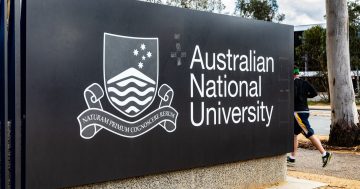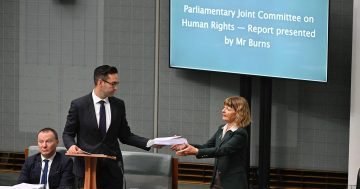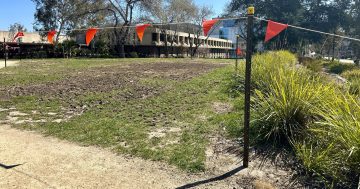
The ANU is preparing for an influx of Chinese students after Beijing’s edict on online study. Photo: Laura Liu.
The thousands of Chinese students expected to return to Canberra for on-campus study after Beijing announced that degrees earned online would no longer be recognised will be a welcome boost for the ACT economy and its tight jobs market.
The decision caught universities on the hop and comes after China’s dramatic unwinding of COVID-19 restrictions.
The pandemic’s travel bans wiped out the international student market in Canberra, deeply impacting the Australian National University’s revenue and forcing it to cut staff and programs.
Estimates of the number of Chinese students living in Canberra before the pandemic range from 8000 to 11,000 across higher education, vocational education and English language intensive courses, or about 17 per cent of the ACT’s tertiary student cohort.
The loss of international students also contributed to labour shortages in Canberra, with businesses struggling to recover from COVID restrictions and unable to find staff.
International students, including those from China, have been slowly returning to Canberra, but the rush will now be on to resume and complete their studies in person.
They will face hurdles, including booking flights, applying for visas and finding accommodation.
Chinese students told Region that while COVID testing and visas are not major concerns, limited direct flights from China to Australia had led to higher ticket prices.
They said the biggest challenge would be the tight rental market, making it difficult to secure housing in a timely manner.
“I’m looking forward to the upcoming campus life and excited for the new experience,” said one student, “but the rush policy has caught many of us off guard.
“It’s too hard to find a room to stay in, especially as I am searching from abroad. I have been looking for a room for a while, but I still haven’t found a suitable one. And there are limited options available in Canberra.”
A student from a university in Sydney said: “Finding an affordable room within my budget is the biggest issue for me. The rental cost is too high.
“The rush policy also has added stress for me. I had to suddenly return to Australia to attend in-person classes, which disrupted all my plans, including being away from my family, because I am preparing to get married.
“Also, with a sudden influx of international students returning to campus, we are concerned about the potential shortage in tutors and classroom space, resulting in the possibility of continued online classes even while in Australia.”
The ANU would not say how many Chinese students it was expecting to be on campus before the edict or how many more it would now have to cater for, but it hoped the majority of its offshore students would return for the start of semester 1 on 20 February.
A spokesperson said the ANU, where most of Canberra’s Chinese students study, urged those studying remotely offshore to start making travel arrangements as soon as possible.
In December, the ANU announced plans to move back to pre-pandemic study modes in 2023.
“We expect to complete the full transition to in-person study with all our students on campus for semester 2, 2023,” the spokesperson said.
“We are aware this may be challenging for some of our students who are studying offshore. The university will be in touch with impacted students and continue to pass on any updates.”
The spokesperson said the ANU would continue to offer a limited number of courses remotely during semester 1 for students who need more time to arrange their travel plans.
“Rare circumstances, where students are unable to return to campus at all, will be managed on a case-by-case basis,” the spokesperson said.
“International students make a substantial and vibrant contribution to our classrooms, our campus and the Canberra community and we look forward to having all of our staff and students safely back together on campus in 2023.”
Universities Australia Chief Executive Catriona Jackson welcomed the Chinese decision but said there would be logistical issues and universities would be working closely with government and industry to ensure a smooth return for students.
Chief Minister Andrew Barr said the return of Chinese students was great news for the ACT’s universities and the economy.
“When semester 1 of University commences in February, there will be more international students starting study in Canberra since the beginning of the pandemic,” Mr Barr said.
“Prior to the pandemic, international education contributed more than $1 billion annually to the ACT economy. The return of students is a significant boost for our local tertiary education sector, which remains one of the ACT’s biggest employers.”
While business will welcome the students’ return, the Property Council is warning that it will put pressure on an already tight rental market and student accommodation sector.
Executive Director of its Student Accommodation Council Torie Brown said 2022 data showed Chinese students (making up 27 per cent of all residents) and domestic Australian students (26 per cent) were the two biggest cohorts living in purpose-built student accommodation.
“With students scrambling to return earlier than expected, we will see student accommodation full in many markets, which will put pressure on already tight rental markets as students look elsewhere for places to live,” Ms Brown said.





















